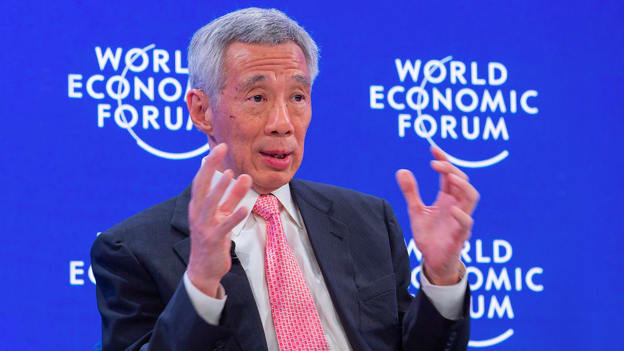WEF Day 2: Singapore PM in conversation with WEF President

On Day 2 of the World Economic Forum meeting in Davos 2020, one of the sessions to draw enormous interest was the conversation between Singapore’s Prime Minister Lee Hsien Loong and Børge Brende, President of the World Economic Forum. Prime Minister Lee joined the President of the WEF to discuss how Singapore has grown so rapidly, expanding on the nation’s geopolitical aspirations, what leadership qualities are essential in the Fourth Industrial Revolution and how technology will continue to transform the region over the coming decade.
Singapore gained its independence in 1965 and has since grown from a former-British trading colony to one of the most competitive economies in the world. Lee has been prime minister since 2004, leading his country through some ups-and-downs to where they sit currently as one of the most powerful economic and tech hubs in the region. According to Brende, in 1965, Singapore’s per capita earnings were $500. Now, they’re $65,000, representing nine percent annual growth.
As Lee said, “We have done reasonably well over the past few years.”
So how did they do it?
America, China and Globalization
Lee opened with an explanation of the three factors that have most influenced Singapore’s success over the past half-century: the United States, China and Globalisation.
Lee said the United States was critical because it generated “peace, stability and security over the Asia Pacific region over the past half-century,” and created a situation where “small countries” like Singapore could have their “place in the sun”.
With China, Singapore fostered a deep and prosperous relationship as both nations expanded. This relationship continues today. “According to the Chinese statistics, Singapore is the biggest source of foreign investment in China,” Lee revealed, showing the depth of the accord.
Lastly, globalization allowed Singapore to “plug into the global economy”, and create a far-reaching, prosperous situation.
However, now, the strategic balance is shifting and relationships have changed. “It was previously effortless to say I’m friends with everybody, now we are pushed to be better friends with one,” said Lee, adding that, “the smaller you are, the more people push you.”
Navigating these challenges
Overall, Lee said Singapore wanted to continue to work with America and China. He stressed, however, that Singaporeans came first in all decision-making. “Singapore’s choices are on its own behalf because we are making decisions for Singapore.”
He admitted that “from time-to-time, you will incur a raised eyebrow, sometimes more than one raised eyebrow.”
Most of all, Lee seemed determined to move forward in the spirit of engagement, collaboration, co-operation, coordination and mutual support. He said he wanted to connect “with centres of vibrancy and future-growth around the world,” and attract and retain the best talent by making Singapore a “place where high-quality people want to live.” To achieve this, they plan to “upgrade companies, people, education and skills.”
“That is what Singapore needs to be,” he said, “while also benefiting Singaporeans across the board.”
Repeating our follies
When asked about last years’ slow-down of Singapore’s growth, Lee was reasonably optimistic but said a lot depended on America’s economy and whether or not it entered a recession.
The key thing is: if you have strategic tensions not being resolved and flaring up further downstream, which can happen then it's not just an impact of the business cycle, it’s an impact on the long term trajectory of the world.
Lee believed that if another global economic downturn were to happen, fiscal policy would be crucial to recovery, adding that investments in infrastructure and education rather than running the deficit can improve productive capacity and set nations on the road to recovery. “I don’t generally believe in a free lunch,” he said. “But I do believe there is a role for fiscal policy.”
In their wide-ranging and thoughtful conversation, Lee and Brende touched on the importance of learning from history - particularly the economic downturn of 2008 and the depression of the 1930s that led to a war. “I don’t think we will repeat our follies,” Lee said. “But it’s possible for us to be inventive in making new mistakes.”
The tremendous vibrancy of tech
When it came to silver linings, Lee pointed to the “tremendous vibrancy” of the tech sector, full of people who “believe they will change the world.” He pointed to the rapid changes made over the last 20 years - Google, Amazon and all the major participants who will become important over the coming decade along with the new opportunities created by technology.
He also warned against the potential problems, highlighting how factors such as social media have not created the “egalitarian nirvana” we imagined it would be.
In today’s business and tech landscape, where constant speed and innovation of ideas are kings, Lee made an appeal to slowly-accumulated knowledge and understanding: “when you speed up the operating cycle by 100, 1000 or 10,000, your operating system will malfunction,” he said. “Your brain doesn’t speed up 10,000 times. You need time to mull it over, to think it, to discuss it, to test it and gradually to get some grey hair to have a better decision about it.”
Looking to the future, when asked if smaller-to-medium sized countries could survive in today’s ‘winner-takes-it-all’ platform economy, Lee was also optimistic.
“If we can participate in the global economy then we are part of it,” he said but emphasised the need for proper rules and regulations to protect those at the heart of it this growing economy.
A wide-ranging and illuminating look into the growth of this relatively new nation, Lee offered a pragmatic but optimistic view of the future: one in which Singapore collaborates, cooperates and works with other nations to secure the country’s prosperity and fashion a place top talent continues to seek out and thrive within.
















